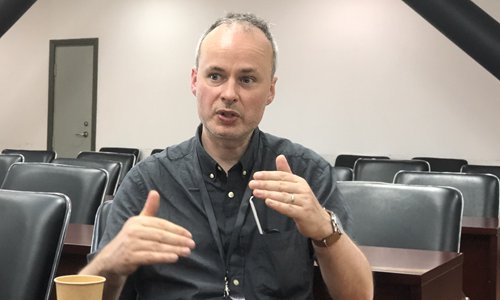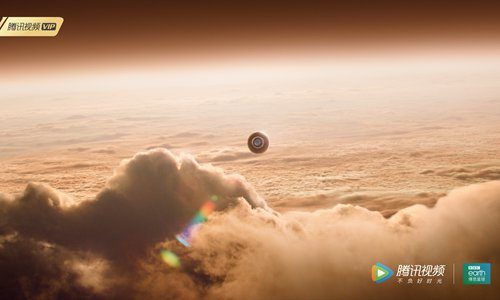HOME >> ARTS
BBC documentary ‘The Planets’ to introduce untold stories of the solar system to audiences
By Xu Liuliu Source:Global Times Published: 2019/5/28 17:07:22

Gideon Bradshaw Photo: Xu Liuliu/GT

Promotional material for The Planets Photo: Courtesy of Tencent Video
Chinese audiences have been inspired to learn more about outer space by the popular sci-fi movie The Wandering Earth, a story about how humanity figures out a way to pilot the Earth out of the solar system to escape the rapidly expanding Sun. However, the plan runs into a hitch after the Earth gets caught in Jupiter's gravity.
A new upcoming space documentary The Planets, which will air on the UK's BBC and China's streaming giant Tencent Video starting Wednesday, will reveal more untold stories of the secret lives of the eight startlingly different worlds that make up our solar system.
Past and future
Narrated by professor Brian Cox, the new series reveals just how active the planets' past lives have been, how intertwined their lives are, and even what the future holds for these neighboring worlds, which shows that they are quite different from the "permanent, unchanging facets of our night sky" that most people think of them as.
"We are trying to be honest as possible, not saying this is truth, but saying it happened a hell of a long time ago," Gideon Bradshaw, the series producer told the Global Times before a prescreening event in Beijing Thursday.
"Sometimes, we are dealing with events taking place 4 billion or 4.5 billion years ago, who knows?"
"Just like Brian Cox said that we don't really know, we just suspect, we have theories, it will be very clear to audiences," he added.
Following 4.5 billion years of history, the series reveals the lives of the planets to be incredibly dynamic. Geological epochs come and go, entire atmospheres are formed and lost and the planets themselves begin to move. This is drama on a planetary scale, with the life story of each planet center stage.
Bradshaw revealed that two or three experts helped "to make sure to check and balance before we went too far from consensus."
"It's such a fast changing world because there are papers coming out all the time like [NASA's] New Horizons," said Bradshaw, who, as the show's producer, is slightly worried about the series.
"Hopefully what we have today is very good and representative of what the field is right now."
Not all planets are born equal
A part of Tencent Video's Star Travel Season series of programs, which also includes Cosmos: A Space Time Odyssey, Wonders of the Universe and Mars Season 2, the new BBC series opens with the birth of the planets, with the first episode revealing the hidden lives of the planets closest to the Sun: Mercury, Venus and Earth. Each episode continues the journey out from the sun for encounters with Mars, Jupiter, Saturn, Uranus and finally Neptune to complete the story.
Making use of the most spectacular images of the planets ever captured by various space missions and filming in a range of the places on Earth that most resemble each unique world, the series offers audiences a new visionary way to experience these distant planets with the help of cutting-edge special effects.
With the help of Academy Award-winning VFX company Lola Post Production, each planet has been brought to vivid life. High-resolution imagery and 3D data of the landscapes beamed back from spacecraft scattered across the solar system have been combined to create detailed and highly accurate CG models of the planetary terrain as seen from space.
To represent the landscapes of other planets, Iceland became Pluto, active volcanoes stood in for Jupiter's volcanic moon Io and Wadi Rum in Jordan stood in for Mars. This photography became the basis for VFX shots that place the audience on the surface of distant planets, recreating a huge range of bizarre and wonderful vistas. In this way the series transports the audience through time and space and reveal that not all planets are born equal.
Inspired by Chinese sci-fi
Targeting the mainstream audience, the series has been made "entertaining and dramatic" by describing the planets as different characters according to their own story so as to grab viewer's attention.
"But all the scientists hate to gender the planets," the producer said.
"We don't use the pronouns in the film, but some titles, like Mars and Earth, we call the Two Sisters, and Jupiter, we call The Godfather."
Another similarity the series has with Chinese movie The Wandering Earth is that one scene was inspired by the writings of Chinese sci-fi writer Liu Cixin, the author of the story upon which the movie is based.
"It is his The Three-Body Problem, the first Chinese sci-fi I've read," Bradshaw said, explaining that a US producer introduced the book to him.
"How smart he is! Fiction with Chinese culture in it makes it really fresh and interesting to me. He really knows this stuff, the way he used his ideas about physics, the solar system, geography of the solar system. It's so enjoyable reading it," Bradshaw said, noting that he is halfway through the book.
According to Zhu Lexian, general manager of Tencent Penguin Pictures Documentary Studio, Tencent Video is confident about the series' performance in China.
"Last year's Dynasties, also a coproduction between BBC Studios and us, has become the highest-ranked documentary [on our platform], mainly due to how innovative it was. The Planets, which makes breakthroughs in storytelling, filming and narration, is not only for astronomy enthusiasts, but also young audiences, who can join the discussion and fall in love with it," Zhu told the Global Times in an email.
Zhu noted that other top BBC documentaries will be coming to Tencent Video.
Newspaper headline: Journey through time and space
Posted in: TV,CULTURE & LEISURE,ARTS FOCUS